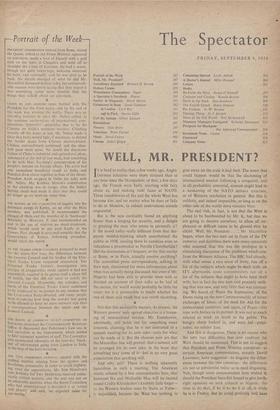Portrait of the Week
PRESIDENT EISENHOWER arrived from Bonn, visited the Queen, talked to the Prime Minister, appeared on television, made a fool of himself with a golf club on the lawn at Chequers and went off to shoulder the Cross of Lorraine. He had•a warm, though not quite ticker-tape, welcome wherever he went, and repeatedly said he was glad .to..be hack. No details emerged of what he and Mr. Macmillan discussed in their talks, but unimpeach- able sources were heard saying that they hoped it was something. rather more sensible than the things they talked about on television.
*
CRISIS IN AND AROUND INDIA battled with the President for the front pages, and by the end of the week was winning the battle. There was an alarming increase in what Mr. Nehru called, in the ominous euphemisms of international com- plications, 'pinpricks'---pinpricks, that is, by the Chinese on India's northern. borders. Climbing wearily off the fence at last, Mr. Nehru made it clear that India would fight, if necesary, to defend the .border states from Chinese encroachment. Chinese encroachment continued, and the situa- tion grew more tense. No doubt the disastrous failure of China's industrial and agricultural plans. announced at the end of last week, had something to do with Mao Tsc-tung's concentration of his people's interest on foreign affairs. The crisis had one immediate beneficial result as India and Pakistan drew closer together in face of the threat: President Ayuh stopped in Delhi for talks with Mr. Nehru. Mr. Krishna Menon's contribution to the situation was to resign, after the Indian Service chiefs had made it clear that they could no longer go on working under him.
*
THE REPORT OF THE COMMITTEE of inquiry into the detention camps in Kenya, set up after the Hola murders, was published. It recommended the closure of Hola and the transfer of its 'hard-core' detainees to Manyani, It also recommended an end to the use of violence as shock-treatthent, which would seem to put paid finally to the Cowan Plan, though it remained possible that the Government of Kenya, following precedent. would reject the report.
*
AS THE TRADES UNION CONGRESS prepared to meet for the ninety-first time, the differences between the General Council and the leaders of the Elec- trical Trades Union remained unresolved. The Electrical 'Trades Union's investigation into charges of irregularities made against it had not unnaturally resulted in its giving itself a clean bill of health, but this did not seem to satisfy the General Council. Meanwhile, the activities and funds of the Electrical Trades Union continued to he employed by its leaders in any manner that the Communist Party, directed. and many people were wondering how long the scandal was going to be. allowed to have no more outward sign than a correspondence between the union and the General Council.
I IIE HOUSE OF COMMOW SELECT COMMITTEE on Estimates examined the Commonwealth Relations Office. It discovered that Parkinson's Law was in full operation in the Department. which tended to hire 'excessive' numbers of staff. The Corrimittee also commented adversely on the four-day 'black- out' of information going from London to India at the time of the Suez invasion.
*
TIM' 13TH EDINBURGH FESTIVAL opened with the ordinal number missing from the posters and brochures, presumably in order to avoid frighten- ing away the superstitious. Mr. lain Hamilton's new Sinfonia for Two Orchestras received enthu- siastic critical acclaim, and the seal was put on its admirable qualities when the Burns Committee who had coMmissioned it described i1 as 'rotten and ghastly' and said, 'we expected value for our money,'


































 Previous page
Previous page